Unit 3 Computers教案
- 格式:doc
- 大小:20.43 KB
- 文档页数:3
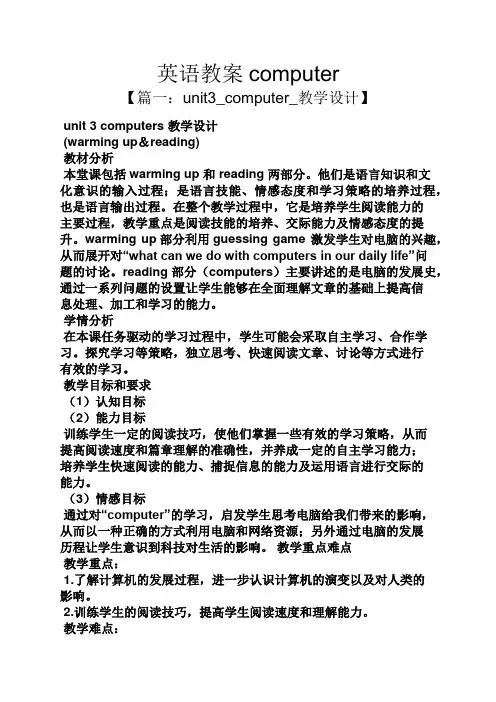
英语教案computer【篇一:unit3_computer_教学设计】unit 3 computers 教学设计(warming up&reading)教材分析本堂课包括warming up 和 reading 两部分。
他们是语言知识和文化意识的输入过程;是语言技能、情感态度和学习策略的培养过程,也是语言输出过程。
在整个教学过程中,它是培养学生阅读能力的主要过程,教学重点是阅读技能的培养、交际能力及情感态度的提升。
warming up部分利用guessing game 激发学生对电脑的兴趣,从而展开对“what can we do with computers in our daily life”问题的讨论。
reading部分(computers)主要讲述的是电脑的发展史,通过一系列问题的设置让学生能够在全面理解文章的基础上提高信息处理、加工和学习的能力。
学情分析在本课任务驱动的学习过程中,学生可能会采取自主学习、合作学习。
探究学习等策略,独立思考、快速阅读文章、讨论等方式进行有效的学习。
教学目标和要求(1)认知目标(2)能力目标训练学生一定的阅读技巧,使他们掌握一些有效的学习策略,从而提高阅读速度和篇章理解的准确性,并养成一定的自主学习能力;培养学生快速阅读的能力、捕捉信息的能力及运用语言进行交际的能力。
(3)情感目标通过对“computer”的学习,启发学生思考电脑给我们带来的影响,从而以一种正确的方式利用电脑和网络资源;另外通过电脑的发展历程让学生意识到科技对生活的影响。
教学重点难点教学重点:1.了解计算机的发展过程,进一步认识计算机的演变以及对人类的影响。
2.训练学生的阅读技巧,提高学生阅读速度和理解能力。
教学难点:对所获取的信息进行处理、加工和学习,形成有效的学习策略。
教学策略与手段1.任务型教学2.课堂操练和小组讨论3.多媒体教学教学过程step 1 lead—in(热身活动)1. guessing gamet: good afternoon, class. before our lesson, i would like to play a guessing game with you. if you know the answers, please say it out. are you ready? ok, here we go.i am very old now. i was born in china. many people used me for calculating in the past, but now i am a bit lonely because they don’t like me now.abacusin china, a lot of students use me when solving mathematical problems.calculatori can be used for calculating, sending e-mails, watching movies online. however, i am not a pc, because i am small enough for you to take me with you.t:no.3 there is no words description, only pictures. so look at these pictures, do you know who am i?yes, very good. you are really clever. and today we are going to learn a new unit. unit 3 computers.2. the history of computers.t: my dear class, nowadays nearly everyone uses computers at home or in their office. but do you know the history of computers? look at these inventions. can you put them in an order according to the time when they appeared?( ) analytical machine ( ) laptop( ) calculating machine( ) robot( ) pc ( ) universal machinet: computers develop with a long history, and i think many scientists devote themselves to improving the functions of computers. right? therefore, we can use computers conveniently. so my next question is “what can we use computers to do in our daily life?”设计意图:通过围绕电脑这一主题展开,话题贴近我们生活,容易调动学生的积极性,激活他们的思维。

教师学科教案[ 20 – 20 学年度第__学期]任教学科:_____________任教年级:_____________任教老师:_____________xx市实验学校Unit 3 ComputersPeriod 1&2, Warming Up, Pre-reading, and ReadingTeaching aims1. Knowledge aims(1)Get the students to learn the useful and expressions in this part.(2)Let students to learn about history and basic knowledge of computers.1.Ability aimsDevelop students' reading abilities and let them learn different reading skills. 3.Emotion aims :Arouse students' great interest in learning computers and let them learn to use the computers in their daily lives.Teaching difficult and important points1.Let the students learn more about history and basic knowledge of computers.2.Get the students to learn different reading skills.Teaching methods1.Task-based teaching and learning2.Cooperative learning3.DiscussionTeaching procedures and waysStep1.Warming upTask1: How much do you know about computers? (Make a survey)Task2: What is it?Give some sentences to describe different kinds of calculating objects and some pictures to help the students to guess what it is?① An old calculating machine used in China until now.An abacus② It is a new calculating machine which can solve a large number of mathematical problems.A calculator③ It is built to solve some mathematical problems. But it is too big.A huge computer④ It is a computer which can solve all kinds of problems and is used widely now .A PC / desktop⑤ It is a kind of computer which can be taken conveniently(方便).A laptop / notebook computerStep2.pre-readingCan you put these inventions in an order according to the time when they appeared? ( ) Analytical machine(分析机)( ) Laptop( ) Calculating machine (计算机器)( ) Robot/android( ) PC( ) Universal machine(通用机器)Step3. Reading4.SkimmingTask 1. Find out the topic sentences of each paragraph (P19.Ex2)Task 2 .Summarize the general idea of this passage.5.ScanningTask1. True or False1.In 1642 I began as a calculating machine and could solve any mathematicalproblem. (F: solve any calculating problem)2.My real father was Charles Babbage, who wrote a book and build me in1936.(F: Alan Turning)3.After I got my new transistors in the 1960s, I became smaller but cleverer andquicker.(T)4.I was brought into people's homes in the 1970s.(T)5.Since my birth I have been built to take the place of human race.(F: build toserve human race)(3)Careful- readingTask 1: Look at the timeline below. Fill in the blanks with information from the reading text.1642: The computer began as a calculating machine1822: The Analytical Machine was made by Charles Babbage.1936: The computer grew rapidly both in size and in brainpower.1940s: The computers had grown as large as a room.1960s: The first family of computers was connected to each other.1970s: Computers were used in offices and homesNow: Computers connect people all over the world together.Step4. Conclusion of the textHow did computers develop?A calculating machine →_____________→_________________→_________________→________________→_____________→ ________________→________________→_ many new applicationsPeriod 3 Vocabulary and Useful Expressions◆.commonn. 1. an area of grassland with no fences which all people are free to use or a piece of open land for recreational use in an urban area (常用于专有名词中): Every Saturday Jean went riding on the village common. Harlow Common is very beautiful in winter.哈洛公园在冬天时风景很美。
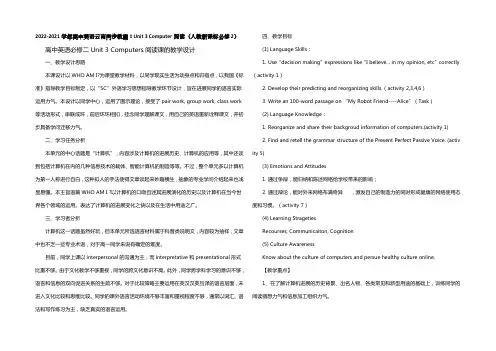
2022-2021学年高中英语云南同步教案:Unit 3 Computer阅读(人教新课标必修2)高中英语必修二Unit 3 Computers阅读课的教学设计一、教学设计思路本课设计以WHO AM I?为课堂教学材料,以同学现实生活为动身点和归宿点,以我国《标准》指导教学目标制定,以“5C”外语学习思想指导教学环节设计,旨在进展同学的语言实际运用力气。
本设计以同学中心,运用了图示理论,接受了pair work, group work, class work 等活动形式,串联成环,前后环环相扣,挂念同学理解课文,用自己的英语重新诠释课文,并初步具备学问迁移力气。
二、学习任务分析本单元的中心话题是“计算机”,内容涉及计算机的进展历史、计算机的应用等,其中还谈到包括计算机在内的几种信息技术的载体、智能计算机的制造等等。
不过,整个单元多以计算机为第一人称进行自白,这种拟人的手法使得文章谈起来妙趣横生,抽象的专业学问介绍起来也浅显易懂。
本主旨语篇WHO AM I ?以计算机的口吻自述其进展演化的历史以及计算机在当今世界各个领域的运用。
表达了计算机的进展变化之快以及在生活中用途之广。
三、学习者分析计算机这一话题虽然好玩,但本单元所选语言材料属于科普类说明文,内容较为抽样,文章中也不乏一些专业术语,对于高一同学来说有确定的难度。
目前,同学上课以interpersonal的沟通为主,而interpretative和presentational形式比重不够。
由于文化教学不够重视,同学的跨文化意识不高。
此外,同学跨学科学习的意识不够,语言和信息的双向促进关系的生疏不够。
对于比较策略主要运用在英汉汉英互译的语言层面,未进入文化比较和思维比较。
同学的课外语言活动环境不够丰富和重视程度不够,通常以词汇、语法和写作练习为主,缺乏真实的语言运用。
四、教学目标(1) Language Skills:1. Use “decision making” expressions like “I believe... in my opinion, etc” correctly.(activity 1)2. Develop their predicting and reorganizing skills.(activity 2,3,4,6)3. Write an 100-word passage on “My Robot Friend----Alice”(Task)(2) Language Knowledge:1. Reorganize and share their backgroud information of computers.(activity 1)2. Find and retell the grammar structure of the Present Perfect Passive Voice. (activ ity 5)(3) Emotions and Attitudes1. 通过争辩,能归纳和陈述网络给学校带来的影响;2. 通过辩论,能对外来网络布满奇异,激发自己的制造力的同时形成健康的网络使用态度和习惯。
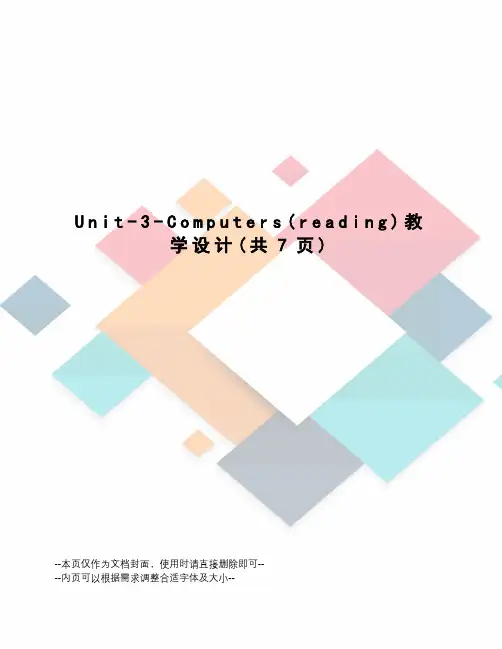
U n i t-3-C o m p u t e r s(r e a d i n g)教学设计(共7页)--本页仅作为文档封面,使用时请直接删除即可----内页可以根据需求调整合适字体及大小--Unit 3 ComputersReading: Who Am I?I. Lesson typePeriod 1 ReadingII. The analysis of teaching materialThe title of the reading part is Who Am I The reading mainly talks about the quick development of computers and the wide application in everydifferent aspect by using the first person. Sixtypes of the computer technology, which are a calculating machine、an analytical machine、an artificial intelligence、a universal machine、aPC(personal computer)/ a laptop and the Internet, were introduced in this passage. With the development of the technology, computers have changed frequently. It is widely used in varies aspects in our life. From the reading part,students will obtain more knowledge about computers, get the writing ideas clearly, and master thereading strategies in order to understand the whole passage in three aspects of information knowledge、language knowledge and discourse knowledge.III. The analysis of learning conditionStudents have collected some information about computers. They have learned new words in this unit. They also have mastered some reading strategiessuch as skimming and scanning. But sometimes they could not use these strategies correctly and efficiently. Besides, they also have the trouble in predicting the meaning of words、expressions or sentences.IV. Teaching aims1.Knowledge1)Students are able to master new words andexpressions.2)Students are able to get the development andthe basic knowledge of computers.2.Ability1)Students are able to learn how to describedifferent kinds of computers in English.2)Students are able to improve their readingstrategies, such as skimming、scanning.3.Emotion1)Students are able to inspire their stronginterests in computers.2)Students are able to strengthen theirimagination and creativity.3)Students are able to manage their time to usecomputers correctly.V. Teaching key and difficult pointsKey points: remember new words and expressions;get the basic knowledge of computers;master and use different reading strategies.Difficult points: get the basic knowledge of computers;master and use different reading strategies.VI. Teaching methodsTask-based Language Teaching (TBLT); Cooperative learning; DiscussionVII. Teaching aidsA multimedia; a laser presenter; a box ofcolorful chalksVIII. Teaching proceduresStep1. Warming upT: Good morning, boys and girls. Today we aregoing to talk about Unit 3 Computers.T: Are you familiar with the computer What do you know about it Now let’s play a quick-question game. Present 10 questions on the PPT.T: Do you know in what ways computers are used today?Step 2 Pre-readingPresent a video about the development of computers. Ask students to put these inventions in time order in pairs. After reading the passage, check to see if they were right.T: What do you think will be the next development? Present a short news about the robot in our daily life.T: let’s move to our reading part. After reading, you may have more ideas about the development of computers in the future.Step 3 While-readingTask1 SkimmingAsk students to skim the passage quickly to answer the question Who Am I? with the help of these two pictures in reading part, and then choose the main idea of this passage.Ask students why the passage is introduced by the first person.Task 2 ScanningAsk students to read the passage again to finish the timeline in Comprehending 1.1642:_____________________________________________1822: The analytical machine was made by Charles_____:_____________________________________________1940s:__________________________________________________: The first family of computers was connected to each other.1970s:_____________________________________________Now: ______________________________________________ Task 3 Careful readingAsk students to read the passage carefully to complete the chart in Comprehending 2.tubes communicationsfinanceIX. Post-readingAsk students to finish True or False questions on the PPT.(If false, ask students to find out the mistakesand correct them.)Put the inventions in order, and ask students to check they were right.X. DiscussionAsk students to discuss advantages and disadvantages of computers with their group members. After 5 minutes to ask some groups to share their ideas.XI. SummaryToday we have learned about the development of computers. Every coin has two sides. As students,we should make the best use of computers to help us study.XII. Homework1.Write down your opinion about advantages anddisadvantages of computers no less than three points foreach one.2.Translate the passage into Chinese.3.Preview The Present Perfect Passive Voice. XIII. BlackboardUnit 3 ComputersReading: Who Am Ifirst person。
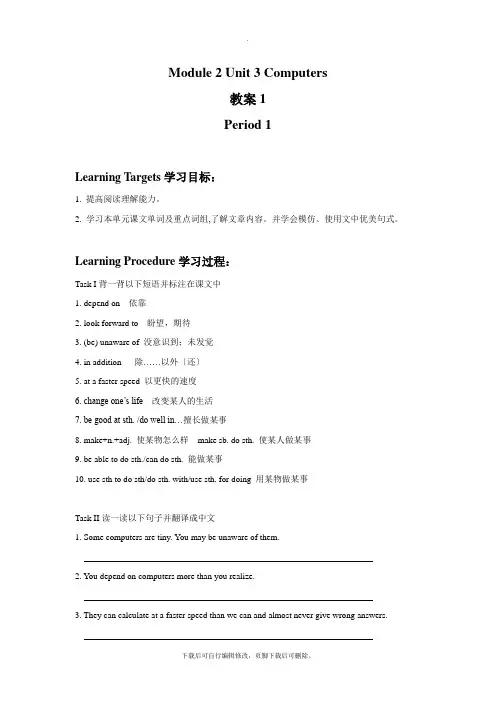
Module 2 Unit 3 Computers教案1Period 1Learning Targets学习目标:1. 提高阅读理解能力。
2. 学习本单元课文单词及重点词组,了解文章内容。
并学会模仿、使用文中优美句式。
Learning Procedure学习过程:Task I背一背以下短语并标注在课文中1. depend on 依靠2. look forward to 盼望,期待3. (be) unaware of 没意识到;未发觉4. in addition 除……以外〔还〕5. at a faster speed 以更快的速度6. change one’s life 改变某人的生活7. be good at sth. /do well in…擅长做某事8. make+n.+adj. 使某物怎么样make sb. do sth. 使某人做某事9. be able to do sth./can do sth. 能做某事10. use sth to do sth/do sth. with/use sth. for doing 用某物做某事Task II读一读以下句子并翻译成中文1. Some computers are tiny. You may be unaware of them.2. You depend on computers more than you realize.3. They can calculate at a faster speed than we can and almost never give wrong answers.4. In addition, computers can do important jobs like operating railways and flying planes and spaceships.5. Your brain can produce new ideas but computers cannot.6. However, one day computers may be able to do a better job than human beings.7. What will happen to us if computers can do all our jobs?8. Computers changed our lives, but will they make them better?___________________________________________________________________Task III学一学练一练以下知识点1. depend 词性_____; 形容词_________; 名词__________ ;反义词_________【搭配】依靠,依赖于__________(动词短语)_______________(形容词短语)不要依赖父母,我们应该学着独立。
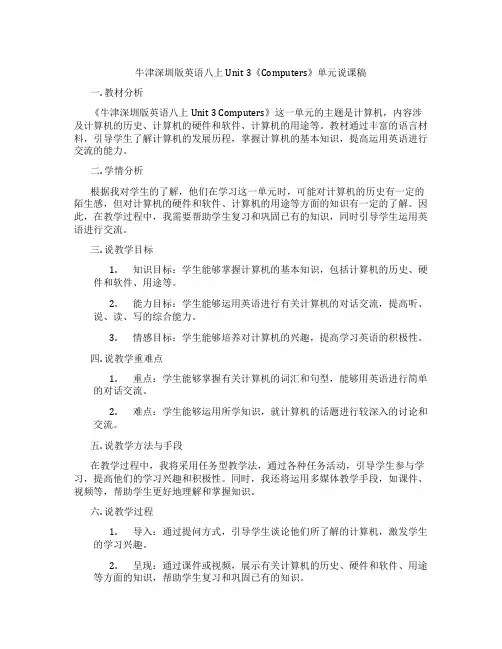
牛津深圳版英语八上Unit 3《Computers》单元说课稿一. 教材分析《牛津深圳版英语八上Unit 3 Computers》这一单元的主题是计算机,内容涉及计算机的历史、计算机的硬件和软件、计算机的用途等。
教材通过丰富的语言材料,引导学生了解计算机的发展历程,掌握计算机的基本知识,提高运用英语进行交流的能力。
二. 学情分析根据我对学生的了解,他们在学习这一单元时,可能对计算机的历史有一定的陌生感,但对计算机的硬件和软件、计算机的用途等方面的知识有一定的了解。
因此,在教学过程中,我需要帮助学生复习和巩固已有的知识,同时引导学生运用英语进行交流。
三. 说教学目标1.知识目标:学生能够掌握计算机的基本知识,包括计算机的历史、硬件和软件、用途等。
2.能力目标:学生能够运用英语进行有关计算机的对话交流,提高听、说、读、写的综合能力。
3.情感目标:学生能够培养对计算机的兴趣,提高学习英语的积极性。
四. 说教学重难点1.重点:学生能够掌握有关计算机的词汇和句型,能够用英语进行简单的对话交流。
2.难点:学生能够运用所学知识,就计算机的话题进行较深入的讨论和交流。
五. 说教学方法与手段在教学过程中,我将采用任务型教学法,通过各种任务活动,引导学生参与学习,提高他们的学习兴趣和积极性。
同时,我还将运用多媒体教学手段,如课件、视频等,帮助学生更好地理解和掌握知识。
六. 说教学过程1.导入:通过提问方式,引导学生谈论他们所了解的计算机,激发学生的学习兴趣。
2.呈现:通过课件或视频,展示有关计算机的历史、硬件和软件、用途等方面的知识,帮助学生复习和巩固已有的知识。
3.实践:学生分组进行讨论,用英语讨论计算机的用途和他们的计算机使用经历,引导学生运用英语进行交流。
4.输出:学生进行角色扮演,模拟计算机店的情景,运用所学知识进行对话交流。
5.复习:通过各种练习活动,帮助学生巩固所学知识。
七. 说板书设计板书设计将包括课题《Computers》、本节课的主要词汇和句型,以及课堂活动的步骤和任务。
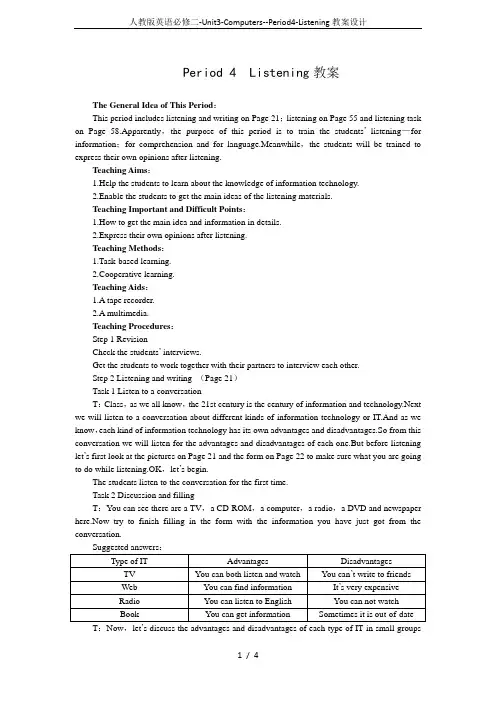
Period 4 Listening教案The General Idea of This Period:This period includes listening and writing on Page 21;listening on Page 55 and listening task on Page 58.Apparently,the purpose of this period is to train the students’listening—for information;for comprehension and for language.Meanwhile,the students will be trained to express their own opinions after listening.Teaching Aims:1.Help the students to learn about the knowledge of information technology.2.Enable the students to get the main ideas of the listening materials.Teaching Important and Difficult Points:1.How to get the main idea and information in details.2.Express their own opinions after listening.Teaching Methods:1.Task-based learning.2.Cooperative learning.Teaching Aids:1.A tape recorder.2.A multimedia.Teaching Procedures:Step 1 RevisionCheck the students’ interviews.Get the students to work together with their partners to interview each other.Step 2 Listening and writing (Page 21)Task 1 Listen to a conversationT:Class,as we all know,the 21st century is the century of information and technology.Next we will listen to a conversation about different kinds of information technology or IT.And as we know,each kind of information technology has its own advantages and disadvantages.So from this conversation we will listen for the advantages and disadvantages of each one.But before listening let’s first look at the pictures on Page 21 and the form on Page 22 to make sure what you are going to do while listening.OK,let’s begin.The students listen to the conversation for the first time.Task 2 Discussion and fillingT:You can see there are a TV,a CD-ROM,a computer,a radio,a DVD and newspaper here.Now try to finish filling in the form with the information you have just got from the conversation.and then decide which type of IT is best for you to use,according to the form above and explain the reasons.While discussing,remember to use the following expressions:I think that...In my opinion...I believe that...I agree because...I disagree because...I’ve decided that...Step 3 Listening (Page 55)T:Now come to the listening on Page 55.Before you listening,please read the requirements of Ex.1.After that,you will find the three robots from the pictures above on Page 55 and number them.The possible number:Picture 1—No.3 Picture 3—No.2 Picture 4—No.1T:Now please look at these boxes on Page 55 before you listen to the tape again,and try to find out the listening points.Pay more attention to these points and you may make some notes while listening.Three minutes later.T:Now try to fill in the boxes with the information from the listening material,and then check your answers with your partners.Step 4 Listening task (Page 58)T:Now please turn to Page 58,and finish the listening task.As we know,computers are used widely and put into androids.Please look at the pictures above.There are two androids in it.One works as a maid.The other works in a car factory.They are friends and they were made at the same time.Now they are talking about their lives and what it feels like to be android.OK,please listen carefully to their problems and fill in the form.I’ll play the tape twice.After listening.T:Try to fill in the forms as quickly as you can,and then we will check the answers in class.their lives.They are treated badly.Now you are going to make a list of the rights that androids should have so that they will be treated better.You can work with your partners and have discussion.Suggested answers:1.They should be able to choose the work they do.2.They should have their own time.3.They should be able to change their jobs.4.They should be able to decide their own future.5.They should be able to taste,smell,feel,etc.Step 5 AssignmentT:Class,I really appreciate your good performance in this listening class.I can see that your listening has greatly improved since you came to the senior school.Keep on your good work!OK,we have no time left.I’d like to assign you some homework to do.1.Go over the listening and writing on Page 21 and get ready for the writing.Step 6 The Design of the Writing on the BlackboardUnit 3 ComputersPeriod 4Step 7 Record after Teaching。

信息技术的发展已经深深地嵌入到我们的生活中。
计算机的出现彻底改变了人们传统的生产方式和生活方式。
现代教育不再是仅限于背书和抄板书,而是花费大量的时间和精力去思考、去分析和去实践。
在这样一个信息时代,教师的角色也随之转变。
我们不仅需要教授知识,还需要培养学生的信息能力,帮助他们理解和利用科技并运用它们支持我们的学习和生活。
高一英语必修2 Unit3 Computers全单元教案是一份非常重要的信息技术教案。
这个单元是有关于计算机和互联网的,向学生介绍了计算机的历史和发展,软件和硬件,以及学习计算机和互联网所需的相关知识。
第一课:Computers in Everyday Life这一课介绍了计算机在生活中的应用以及与人们的生活密切相关的一些软件。
我们可以向学生展示各种各样的工具软件,如视频制作、图片编辑、文档编辑、音频制作等等。
我们也可以通过展示计算机硬件的内部结构来引导学生了解计算机是如何工作的。
第二课:The Development of Computers这一课涵盖了计算机诞生以来的漫长历史。
从最初的机械计算器到现代的个人计算机,这里介绍了计算机的种类、发展和特点。
学生能够学习计算机的历史,了解计算机技术的发展和趋势,以及计算机的应用范围。
第三课:Computer and Society这一课程介绍了计算机在社会生活中的应用,并引导学生思考计算机技术对社会的影响,特别是当它开始影响人们的生活、工作和教育时。
我们将会讨论有关网络安全问题,从而让学生了解如何安全地使用计算机。
第四课:Software这一课介绍了计算机系统中的软件,包括操作系统、应用软件、编译器等等。
学生将了解到不同类型的软件的特点,掌握基本的软件使用技巧。
第五课:Data Storage这一课主要介绍了计算机数据存储,包括内存、硬盘等。
学生将学习如何存储、传输和访问数据,并了解如何保护我们的数据。
第六课:The Internet这一课介绍了互联网的原理和应用。
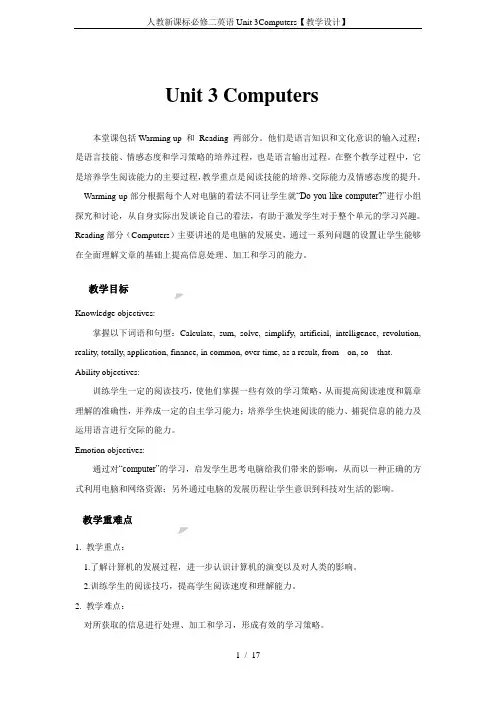
Unit 3 Computers本堂课包括Warming up 和Reading 两部分。
他们是语言知识和文化意识的输入过程;是语言技能、情感态度和学习策略的培养过程,也是语言输出过程。
在整个教学过程中,它是培养学生阅读能力的主要过程,教学重点是阅读技能的培养、交际能力及情感态度的提升。
Warming up部分根据每个人对电脑的看法不同让学生就“Do you like computer?”进行小组探究和讨论,从自身实际出发谈论自己的看法,有助于激发学生对于整个单元的学习兴趣。
Reading部分(Computers)主要讲述的是电脑的发展史,通过一系列问题的设置让学生能够在全面理解文章的基础上提高信息处理、加工和学习的能力。
Knowledge objectives:掌握以下词语和句型:Calculate,sum, solve, simplify, artificial, intelligence, revolution,reality, totally, application, finance, in common, over time, as a result, from···on, so···that. Ability objectives:训练学生一定的阅读技巧,使他们掌握一些有效的学习策略,从而提高阅读速度和篇章理解的准确性,并养成一定的自主学习能力;培养学生快速阅读的能力、捕捉信息的能力及运用语言进行交际的能力。
Emotion objectives:通过对“computer”的学习,启发学生思考电脑给我们带来的影响,从而以一种正确的方式利用电脑和网络资源;另外通过电脑的发展历程让学生意识到科技对生活的影响。
1. 教学重点:1.了解计算机的发展过程,进一步认识计算机的演变以及对人类的影响。
2.训练学生的阅读技巧,提高学生阅读速度和理解能力。
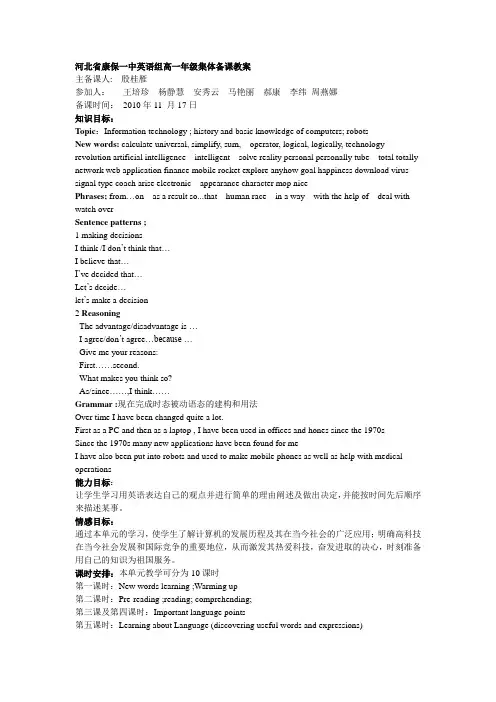
河北省康保一中英语组高一年级集体备课教案主备课人: 殷桂雁参加人:王培珍杨静慧安秀云马艳丽郝康李纬周燕娜备课时间:2010年11 月17日知识目标:Topic:Information technology ; history and basic knowledge of computers; robotsNew words: calculate universal, simplify, sum, operator, logical, logically, technology revolution artificial intelligence intelligent solve reality personal personally tube total totally network web application finance mobile rocket explore anyhow goal happiness download virus signal type coach arise electronic appearance character mop nicePhrases; from…on as a result so...that human race in a way with the help of deal with watch overSentence patterns ;1 making decisionsI think /I don’t think that…I believe that…I’ve decided that…Let’s decide…let’s make a decision2 ReasoningThe advantage/disadvantage is …I agree/don’t agree…because…Give me your reasons:First……second.What makes you think so?As/since……,I think……Grammar :现在完成时态被动语态的建构和用法Over time I have been changed quite a lot.First as a PC and then as a laptop , I have been used in offices and hones since the 1970sSince the 1970s many new applications have been found for meI have also been put into robots and used to make mobile phones as well as help with medical operations能力目标:让学生学习用英语表达自己的观点并进行简单的理由阐述及做出决定,并能按时间先后顺序来描述某事。
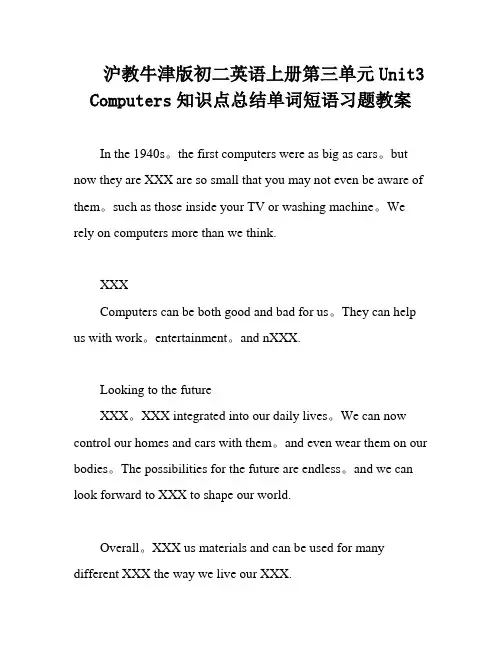
沪教牛津版初二英语上册第三单元Unit3 Computers知识点总结单词短语习题教案In the 1940s。
the first computers were as big as cars。
but now they are XXX are so small that you may not even be aware of them。
such as those inside your TV or washing machine。
We rely on computers more than we think.XXXComputers can be both good and bad for us。
They can help us with work。
entertainment。
and nXXX.Looking to the futureXXX。
XXX integrated into our daily lives。
We can now control our homes and cars with them。
and even wear them on our bodies。
The possibilities for the future are endless。
and we can look forward to XXX to shape our world.Overall。
XXX us materials and can be used for many different XXX the way we live our XXX.1.You always seem to have XXX(改写并补充了意思)2.In the 1940s。
the first computers were larger than cars。
(改正了单数/复数错误)3.You may not be aware of their existence。
Unit 3 ComputersI 教学内容分析本单元的中心话题是“计算机”。
Warming up部分用图片呈现了计算机发展的历史,让学生通过看图讨论的方式了解计算机的发展和演变过程。
Reading部分编者采用了拟人化的手法向读者介绍了计算机的发展历程。
Comprehending部分包括三个练习,分别从事实层面、分析层面和拓展层面考察学生对文章的理解和运用情况。
Learning about language部分的活动突出了形容词和副词用法的区别,并扣本单元的语法点(现在完成时的被动语态)。
Using language部分的听力材料中谈论的是信息技术的几种形态或载体(包括收音机、书籍、电视和电脑;在读说活动中,通过智能机器人参加足球赛的经历向读者介绍了计算机运用的另外一个例子。
Learning Tip部分鼓励学生利用图书馆,网络等课外资源学习英语,有利于学生使用资源策略。
Reading for Fun 部分是一首活泼风趣的小诗,以拟人的方法让机器人自述了心声:尽管日夜忙碌,为人服务,但它相信自己和真实的人类没什么两样。
II.教学重点和难点1.教学重点(1) 本单元的生词和短语;(2)通过学习本单元,使学生了解计算机的发展历程,及其在当今社会的广泛运用;(3)鼓励学生用英语表达自己的观点,进行简单的推理和做出决定。
2.教学难点(1) 教会学生通过时间的先后顺序来表达一件事;(2) 使学生了和掌握现在完成时的被动语态的用法;(3) 指导学生按类别归纳整理词汇,让学生学会有效地记忆词汇的方法;(4) 引导学生发现本单元重点语言结构,让学生自己发现并感悟相关的语言规律,在学习过程中培养语感。
III.教学计划本单元分六课时:第一课时:Warming Up, Pre-reading, Reading第二课时:Language points第三课时:Learning about language第五课时:Speaking, Reading, WritingIV.教学步骤:Period 1 Warming Up, Pre-reading, ReadingTeaching Goals:1. To know something about computers.2. To learn and talk about computers.Teaching Procedures:Step 1. Leading-inPurpose: To activate the Ss and arouse them to talk about the importance of computers in modern society.Ask Ss whether they have a computer or not and what they use it for. Let them talk as much as possible.Step 2. Warming UpPurpose: To get Ss to think about the differe nt ways computers can be made.Pair workGet Ss to look at the following pictures, and then ask them to answer the questions.A huge computer A PCA notebook computer A calculatorAn abacus1. What are they?2. What do they have in common?3. What is a computer?Suggested Answers:1. a huge computer, a personal computer, a notebook computer, a calculator, an abacus2.(1) to be used to calculate;(2) operate by human beings;(3) they are all artificial;(4) show figures in a certain way.3. A computer is a machine which stores knowledge in its memory and does calculations onthat knowledge. This knowledge is stored in symbols; it is called data. A computer usually has a monitor to show results. However, some computers can speak; these computers can be used for voice mail.A computer is now almost always an electronic device. It usually contains materials whichare toxic; these materials will become toxic waste when disposed of. When a new computer is purchased in some places, laws require that the cost of its waste management must also be paid for. This is called product stewardship.Step 3. Pre-readingPurpose: To activate Ss’ interest about computers.Group workAsk Ss the following questions and encourage them to say more.1.How have computers changed our lives ?2.What do you know about computers ?Suggested Answers:1. They’re a much more useful and humane tool than the phone , and with corporate America behind them the networks will be everywhere--- changing our lives more than any technology since the automobile.2. A multi-function electronic device that can execute instructions to perform a task.A device that accepts information, processes it, and supplies an output. A computer usually contains memory, a control unit, arithmetic and logical units, and a means for input and output.A programmable hardware component that is controlled by internally stored programs and that can perform substantial computations (including arithmetic and logic operations) without human intervention. A computer typically consists of one or more processing units, memory units, and associated peripheral input and output devices.Step 4. Reading1. SkimmingPurpose: 1. To get a brief understanding of the text.2. To train the students’ listening ability.First, let Ss skim the text and then listen to the recording of the text. Pay attention to the pauses and pronunciation.2. ScanningPurpose: To get Ss to have some details in the text.Now we are to read the text again and underline all the expressions in the text. Writethem down in your notebook.3. Further ReadingPurpose: To get Ss to get more details about the text.Read the text again and find the information to complete the table, which describes thedevelopment of computer.1642: ___________________________________________________1822: The Analytical Machine was made by Charles Babbage.____: ___________________________________________________1940s: ________________________________________________________: The first family of computers was connected to each other.1970s: ___________________________________________________Now: ___________________________________________________Step 5. RetellPurpose: To have a deep understanding of the text.Ask Ss to use the chart above to retell the development of the computer.One possible version:I, a computer, was a calculating machine in 1642 in France. Then I was built as an Analytical Machine in 1822, which was a technological revolution. I became a “universal machine” in 1936 to solve any mathematical problem. I was not very big at first then I became huge, the size of a large room before I was made smaller and smaller.Getting new transistors, later very small chips I changed my shape. I was connected with other computers and turned out to part of a network in the early 1960s. In 1970s I was brought into people’s homes, and came the Internet.Step 6. Homework1. Write a short passage about the development of computers.2. Finish Ex1 (P19), Ex2 (P20).Period 2 Language pointsStep 1 Word studyGroup workDivide Ss into four groups and ask them to discuss the following words.1. common(1)most widely known; ordinary:Eg He is a common sailor.(2)have nothing/little/something/ a lot in commonEg At first, I think we only had one thing in common, but suddenly I felt we had a lotin common.Eg The two brothers had everything in common in their manners, but the two sisters have little in common.Eg They have nothing in common with one another.2. analytical分析的Eg The scientist analyzed the milk and found it contained too much water.3.technology 科技;技术Eg With the development of technology, we will cure AIDS sooner or later.4.calculate(v.)1)to use numbers to find out a total amount, distance, etc. 计算;核算We haven’t really calculated the cost of the vacation yet.2)to guess sth by using all the information available 推测,估计It is impossible to calculate what influence he had on her life.5.As time went by, I was made smaller.随着时间的推移,我被弄得越来越小。
人教版高中英语必修2《Unit 3 Computers》教案人教版高中英语必修2《Unit 3 puters》教案【一】教学准备教学目标1. To practise listening prehension.practise making decisions and reasoning教学重难点1. To practise listening prehension.practise making decisions and reasoning教学工具课件教学过程Step1. revision1. check the homework exercises.1). It has been reported that children will be offered free education. It has been reported that free education will be offered to children.2). It has been said that we will be offered the latest puter science course book.It has been planned that the latest puter science course book will be offered to us.3). I have been told by Peter that I will be lent his notebook puter for a week.I have been told by Peter that his notebook puter will be lent to me for a week.2. Question: What can puters be used as?Step2. Lead-inAs we know, science and technology is developing very fast and puters have bee smaller and smaller. They have been used in many fields. So, the 21st century is the century of information technology What does it mean?Does information technology/ IT only mean things like puters? Of cause not. Actually, it means more than puters. puters are just one kind of IT. What else do you know is part of IT?(TV, radio, CD-ROM, DVD, books)Step3. Listening (SB)1. Pre-listening: What are the changes brought by different forms of IT ?What are the advantages and disadvantages of them ?2. While-listening:Go through the chart and make sure the students look at the chart before they listen to the tape. (This is to sharpen their attention and listen for the answers. This will also help them get the gist of the text.) Then Listen to the tape and finish filling in the chart. (If necessary, play the tape for several times.)Say: After listening to their talk, we know all kinds of IT have both disadvantages and check the answers together.Type of IT Advantages DisadvantagesTV You can both listen and watch. You cannot write to friends.Web You can find information. It is very expensive.Radio You can listen to English. You cannot watch a film.Book You can get information. Sometimes it is out of date.3. Post-listening:1) (pair work): decide which type of IT is best for you to use right now. Make your choice and give your reasons by using the following expressions.I think that.In my opinion, .I believe that.I agree because.I disagree because.Ive decided that.2) (group work): Discussion :puters are useful and have brought us lots of good things, but they also cause bad effects. What attitude should we have towards the puter? (Make good use of it but never get trapped by it.)Step4. Speaking1. Pre-speakingSay: From what we have learn, we should admit that puters and the web have a great influence on the school education as well as peoples life. It has e into peoples everyday life and many families hold puters in their homes. Now there is a task for you.2. While-speaking1) Situation: You have been asked by your parents to help choose puters for your home. You and your friend have looked at several puters. Talk about the special things each puter can do. Make a decision about which kind of puter to buy and explain why.Information input: Show students some pictures of different puters (desktop puter laptop puter )Language input: Useful expressions (Repeat it to strengthen students ability of use it.)Supporting an opinion Challenging an opinionI think that , because Perhaps, but what if / about ?First, Have you thought about ?One reason is that What makes you think that ?I think it is better because I dont like it because.(Pair work )Use the expressions to support your opinion or challenging others opinions.2) Oral report: (inpidual work )Do an oral report to your father and start your report like this: I looked at many different puters. The one I have chosen is the PEP personal puter. One of the main reasons is that it is suitable for homes. I found that3. Post-speakingConclusionWhat useful expression do we use to make a decision and reason?(In this way, they can review and use the words and phrases again.) Step6 Pre-writingSay: Imagine what problems and delights this android might have to deal with while it is serving you. Try yourself in someone elses shoes is an important way of understanding how other people feel.Then discuss: You are an android. You work for a family with one child who is very spoiled. The parents want you to do everything for them. The parents are nice, but they often ask you to watch over their child. How do you feel? What would you do if the child asked you to do his homework for him? Would you ever tell the child no?Step7 WritingSay: Write a passage about the result of your discussion! It should contain:What do you have to do?What is the child like?What is the parents requirement of the child?What do the parents want you to do?What does the child want you to do?Then what will you do? How do you feel?Sample writing:Hello everybody, my name is Liu am a 321 model work for the Li family. Mr and Mrs Li work very hard Li is an architect and designs great tallapartment Li is a doctor and has to look after many remember all the plans for Mr Li’s projects and can tell Mrs Li which drugs are the best to give any particular patient. And I also look after their library. I store all the books that they borrow from their school or friends in my course my brain is as large as a mountain, so work like that is no trouble to really eat books just like people eat food.The Lis have a child who is very spoiled. He needs me to remember all his school textbooks so that I can do his homework for just gives me the information on the subject, what has to be done and the page numbers and I get on with it while he enjoys himself with his I don’t think it is right to do his homework for him it’s somewhat cheating. However, his parents are very concerned at the pressure of work in school these child has too much homework to do. They like him to go to the key school but they also want him to be able to have hobbies, learn to swim and keep fit! Poor child!So they consider me the most important person in the family after am always introduced to their friends and play with visiting am the perfect family academic aid and, although I was not cheap to buy, Mr Li says I was worth every yuan!Step8 AssessmentGet the students to assess their writing ability according to the following the questions:1. Is your position well developed?2. Are your ideas well organized to the point?3. Do you have a good choice of words and idioms in your writing?4. Do you get a good mastery of plex structures of language?5. What kind of mistakes have you made in your writing?Step9: HomeworkWrite about your discussion. You may begin like this:Hello, everyone. My name is ___. Im 321 model android. I work for the Li family.课后小结学了这节课,你有什么收获?课后习题完成课后习题一、二。
Unit 3 Computers(Listening, Speaking and Writing)教案Unit 3 putersListening, Speaing and ritingGALS:1 T pratise listening prehensin 2T pratise aing deisins and reasning TEAHING PREDURES:Step1 revisin1 he the her exerises1) It has been reprted that hildren ill be ffered free eduatin.It has been reprted that free eduatin ill be ffered t hildren.2) It has been said that e ill be ffered the latest puter siene urse b.It has been planned that the latest puter siene urse b ill be ffered t us.3) I have been tld b Peter that I ill be lent his nteb puter fr a ee.I have been tld b Peter thathis nteb puter ill be lent t e fr a ee.2 Questin: hat an puters be used as?Step2 Lead-inAs e n, siene and tehnlg is develping ver fast and puters have bee saller and saller The have been used in an fields S, the 21st entur is the entur f infratin tehnlg hat des it ean? Des infratin tehnlg/ IT nl ean things lie puters? f ause nt Atuall, it eans re than puters puters are ust ne ind f IT hat else d u n is part f IT? (TV, radi, D-R, DVD, bs……)Step3 Listening (SB)1 Pre-listening: hat are the hanges brught b different frs f IT ?hat are the advantages and disadvantages f the ? 2 hile-listening: G thrugh the hart and ae sure the students l at the hart befre the listen t the tape (This is t sharpen their attentin and listen fr the ansers This ill als help the get the gist f the text) Then Listen t the tape and finish filling in the hart (If neessar, pla the tape fr several ties) Sa: After listening t their tal, e n all inds f IT have bth disadvantages and advantages.Let’s he the ansers tgetherTpe f IT Advantages DisadvantagesTVu an bth listen and ath.u annt rite t friends.ebu an find infratin.It is ver expensive.Radiu an listen t English.u annt ath a fil.Bu an get infratin.Seties it is ut f date.3 Pst-listening: 1) (pair r): deide hih tpe f IT is best fr u t use right n ae ur hie and give ur reasns b using the flling expressins I thin that… In pinin, … I believe that… I agree beause… I disagree beause… I’ve deided that… 2) (grup r): Disussin :puters are useful and have brught us lts f gd things, but the als ause bad effets hat attitude shuld e have tards the puter? (ae gd use f it but never get trapped b it)Step4 Speaing1 Pre-speaingSa: Fr hat e have learn, e shuld adit that puters and the eb have a great influene n the shl eduatin as ell as peple’s life It has e int peple’s everdalife and an failies hld puters in their hes N there is a tas fr u2 hile-speaing 1) Situatin: u have been ased b ur parents t help hse puters fr ur he u and ur friend have led at several puters Tal abut the speial things eah puter an d ae a deisin abut hih ind f puter t bu and explain hInfratin input: Sh students se pitures f different puters (destp puter ≈ laptp puter ≈ …) Language input: Useful expressins (Repeat it t strengthen students’abilit f use it)Supprting an pininhallenging an pininI thin that … , beause …Perhaps, but hat if / abut …?First, …Have u thught abut …?ne reasn is that …hat aes u thin that …?I thin it is better beause…I dn’t lie it beause…(Pair r )Use the expressins t suppr t ur pinin r hallenging ther’s pinins 2) ral reprt: (individual r ) D an ral reprt t ur father and start ur reprt lie this: I led at an different puters The ne I have hsen is the PEP persnal puter ne f the ain reasns is that it is suitable fr hes I fund th at…3 Pst-speaing nlusin—hat useful expressin d e use t ae a deisin and reasn? (In this a, the an revie and use the rds and phrases again) Step6 Pre-ritingSa: Iagine hat prbles and delights this andrid ight have t deal ith hile it is serving u Tr urself in sene else’s shes is an iprtant a f understanding h ther peple feelThen disuss: u are an andrid u r fr a fail ith ne hild h is ver spiled The parents ant u t d everthing fr the The parents are nie, but the ften as u t ath ver their hild H d u feel? hat uld u d if the hild ased u t d his/her her fr hi/her? uld u ever tell the hild “n”?Step7 ritingSa: rite a passage abut the result f ur disussin! It shuld ntain:hat d u have t d?hat is the hild lie?hat is the parents’requireent f the hild?hat d the parents ant u t d?hat des the hild ant u t d?Then hat ill u d? H d u feel?Saple riting:Hell everbd, nae is Liu an.I a a 321 del andrid.I r fr the Li fail r and rs Li r ver hard t.r Li is an arhitet and designs great tall apartent bls.rs Li is a dtr and has t l after an patients.I reeber all the plans fr r Li’s prets and an tell rs Li hih drugs are the best t give an partiular patient And I als l after their librar I stre all the bs that the brr fr their shl r friends in brain.f ursebrain is as large as a untain, s r lie that is n truble t e.I reall eat bs ust lie peple eat fd.The Lis have a hild h is ver spiled He needs e t reeber allhis shl textbs s that I an dhis her fr hi.He ust gives e the infratin n the subet, hat has t be dne and the page nubers and I get n ith it hileheens hiselfith his friends.Seties I dn’t thin it is right t d his her fr hi —it’s sehat heating Hever, his parents are ver nerned at the pressure f r in shl these das.The hild has t uh her t d Thelie hi t g t the e shl but the als anthit be able t have hbbies, learn t si and eep fit! Pr hild!S the nsider e the st iprtant persn in the fail after theselves.I a alas intrdued t their friends and pla ith visiting hildren.I a the perfet fail aadei aid and, althugh I as nt heap t bu, r Li sas I as rth ever uan!Step8 AssessentGet the students t assess their riting abilit arding t the flling the questins:1 Is ur psitin ell develped?2 Are ur ideas ell rganized t the pint?3 D u have a gd hie f rds and idis in ur riting?4 D u get a gd aster f plex strutures f language?hat ind f istaes have u ade in ur riting?Step9: Herrite abut ur disussin u a begin lie this:Hell, everne nae is ___ I’321 del andrid I r fr the Li fail…。
Module 2 Unit 3 Computers教案2Period 2Learning Targets学习目标:学习掌握形容词比拟级和最高级Learning Procedure学习过程:ⅠLearning Strategies1. Self-study2. CooperationⅡLearning Preparation1. Daily sentences: All roads lead to Rome. 条条大路通罗马。
2. Daily reading:A: Hello, Peter, I’ve got some good__________. B: What’s it?A: A foreign lady will teach us English next term.B: Where does she come_____________?A: Canada. It’s _________that she is an excellent teacher.B: Wonderful! I ________ we can make great progress(进步) in English. A: I think so. We can _________ speaking English with her in our free time. B: That sounds good!ⅢLearning ProceduresSelf-observationThe comparative of adjectives & The superlative of adjectives形容词的比拟级&形容词的最高级We use the comparative of adjectives when we compare two things.We use the superlative of adjectives when we compare more than two people or thingsActivity 1: Work out rules about cardinal numbers. 看以下形容词的比拟级,找规律。
教案:Unit 3 Computersby Xiao Teng Teaching Objectives:Knowledge Objectives1. To make the students learn some useful words and expressions.2. To make the students learn about the history and development of computers.Ability Objects1. To improve their reading comprehension ability through some reading steps.2. To help students identify examples of “the present perfect passive voice” in the textMoral Objects1. Enable the students to find out what an important role computers play in our daily lives, and be determined to learn the knowledge of IT well.2. Develop the students’ desire for exploring, the qualities of courage, cooperation, confidence and so onStep1. Leading inA guessing game.(some riddles)Step2. pre-reading1. Put these inventions in an order according to the time when they appeared. After reading, check to see if you were right.( )analytical machine ( )laptop( )calculating machine ( )robot( )PC ( )universal machine2. Listen without opening the book.1. Who is the speaker ?2. Who is the speaker’s father?Step3. While-readingFast reading1. The main idea of the textThe text mainly talks about the _______and _________ of computers. And it is also about the ________ between computers and humans.2. What is the topic sentence of each paragraph?Paragraph1.______________________________________________ Paragraph2.______________________________________________ Paragraph3.______________________________________________3. How did the writer organize the text?The writer organized the text according to the _______.Detailed reading1. Read the text and finish the timeline.1642: The computer began as a __________.1822: the __________ was built by Charles Babbage.1936: Alan Turing wrote a book to describe how a computer could be made to work as a “_____________”.1960s: Computers had new ___________ and became _________ .1970s: First as a________ and then as a_________ ,the computer has been used in offices and homes.Now: Computers __________ people all over the world together.2. How did the computer change in its size, intelligence, speed, and function?Size:Intelligence:S peed:Function:3. Fill in the blanks:I began as a ______ ______ in 1642 in France. In 1822 I was built as an ____ _____. Then in 1936 Alan Turing wrote a book and built a _______ ______.As the years have___ ___, I have been made ___ ___ ____ but I got ____ ____ ___,____ __ ____. In the 1960s they gave me a family____ __ __ _____. Now people call it the Internet. I was _____ ____ ____ ___ in the 1970s.So I became a PC. Since my birth I have truly been built to serve the human race.Step4. Post-readingIn pairs discuss: nowadays what can the computer be used for?Step5. Homework1. Searching for more information about computer.2. Finish the Ex2 and Ex3 in Learning about Language on page20.。
Unit 3 Computers教案
Unit 3 Computers The 4th period: Listening & Speaking GOALS: 1. To practise listening comprehension. 2.To practise making decisions and reasoning TEACHING PROCEDURES: Step1. revision 1. check the homework exercises. 1). It has been reported that children will be offered free education锛?It has been reported that free education will be offered to children锛?2). It has been said that we will be offered the latest computer science course book锛?It has been planned that the latest computer science course book will be offered to us锛?3). I have been told by Peter that I will be lent his notebook computer for a week锛?I have been told by Peter that his notebook computer will be lent to me for a week锛?2. Question: What can computers be used as? Step2. Lead-in As we know, science and technology is developing very fast and computers have become smaller and smaller. They have been used in many fields. So, the 21st century is the century of information technology What does it mean? Does information technology/ IT only mean things like computers? Of cause not. Actually, it means more than computers. Computers are just one kind of IT. What else do you know is part of IT? (TV, radio, CD-ROM, DVD, books鈥︹€? Step3. Listening (SB) 1. Pre-listening: What are the changes brought by different forms of IT ? What are the advantages and disadvantages of them ? 2. While-listening: Go through the chart and make sure the students look at the chart before they listen to the tape. (This is to sharpen their attention and listen for the answers. This will also help them get the gist of the text.) Then Listen to the tape and finish filling in the chart. (If necessary, play the tape for several times.) Say: After listening to their talk, we know all kinds of IT have both disadvantages and advantages锛嶭et鈥檚check the answers together. Type of IT Advantages Disadvantages TV You can both listen and watch锛?You cannot write to friends
锛?Web You can find information锛?It is very expensive锛?Radio You can listen to English锛?You cannot watch a film锛?Book You can get information锛?Sometimes it is out of date锛?3. Post-listening: 1) (pair work): decide which type of IT is best for you to use right now. Make your choice and give your reasons by using the following expressions. I think that鈥? In my opinion, 鈥? I believe that鈥? I agree because鈥?
I disagree because鈥? I鈥檝e decided that鈥? 2) (group work): Discussion : Computers are useful and have brought us lots of good things, but they also cause bad effects. What attitude should we have towards the computer? (Make good use of it but never get trapped by it.) Step4. Speaking 1. Pre-speaking Say: From what we have learn, we should admit that computers and the web have a great influence on the school education as well as people鈥檚life. It has come into people鈥檚everyday life and many families hold computers in their homes. Now there is a task for you. 2. While-speaking 1) Situation: You have been asked by your parents to help choose computers for your home. You and your friend have looked at several computers. Talk about the special things each computer can do. Make a decision about which kind of computer to buy and explain why. Information input: Show students some pictures of different computers (desktop computer & laptop computer & 鈥? Language input: Useful expressions (Repeat it to strengthen students鈥?ability of use it.) Supporting an opinion Challenging an opinion I think that 鈥?, because 鈥?Perhaps, but what if / about 鈥? First, 鈥?Have you thought about 鈥? One reason is that 鈥?What makes you think that 鈥? I think it is better because鈥?I don鈥檛like it because鈥? (Pair work )Use the expressions to support your opinion or challenging other鈥檚opinions. 2) Oral report: (individual work ) Do an oral report to your father and start your report like this: I looked at many different computers. The one I have chosen is the PEP personal computer. One of the main reasons is that it is suitable for homes. I found that鈥?3. Post-speaking Conclusion鈥昗hat useful expression do we use to make a decision and reason? (In this way, they
can review and use the words and phrases again.) Step5. Homework Page 22. writing: Write a report about your choice and try to use the present perfect passive voice as well as the useful words and expressions that have been mentioned above. in your report.。